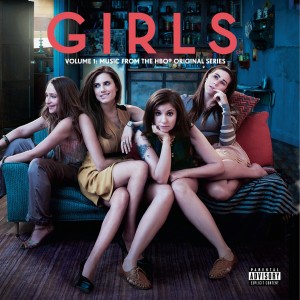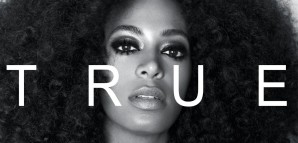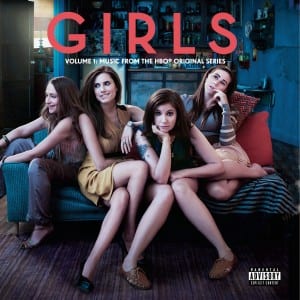This week is the Music Issue at the Voice, so to whet your appetite, we offer up some reviews by Chris Azzopardi — of the soundtrack to the hit HBO comedy Girls as well as the impressive follow-up by Beyonce’s sister Solange, True.
 Girls Soundtrack, Volume 1 (various artists): Robyn’s sad-but-liberating “Dancing on My Own” already made life infinitely better, but then HBO’s groundbreaking series Girls, which just returned for its second season, did something awesome with it last year: They had the show’s star/creator — Lena Dunham’s every-girl Hannah — shake out her boy blues to the tune. Awesome how? Any Robyn fan can relate to the dorkiness of shadowing the Swede’s moves in their bedroom.
Girls Soundtrack, Volume 1 (various artists): Robyn’s sad-but-liberating “Dancing on My Own” already made life infinitely better, but then HBO’s groundbreaking series Girls, which just returned for its second season, did something awesome with it last year: They had the show’s star/creator — Lena Dunham’s every-girl Hannah — shake out her boy blues to the tune. Awesome how? Any Robyn fan can relate to the dorkiness of shadowing the Swede’s moves in their bedroom.
You have to hand it to the music supervisors of Girls: They have an ear for twenty-something “quarter-life crisis” music as much as they understand that girls, too, just wanna have fun. Icona Pop brings the Cyndi Lauper to the party with the unapologetic anthem “I Love It,” as does Santigold’s “Girls” theme — an addictive little joint looped with a merry-go-round of voice samples and a hard bass line.
In the woe-is-me department: Grouplove’s “Everyone’s Gonna Get High” fantastically captures growing up directionless through a surging indie-rock sound, and two tracks in particular — Michael Penn’s “On Your Way” and Harper Simon’s “Wishes and Stars” — are wistful gems. The new song from Tegan and Sara (the girls’ surprising take on The Rolling Stones’ “Fool to Cry,” a bonus track) is a faithful cover that’s characteristically harmonious and also resembles them in their pre-pop days. “Sight of the Sun” from fun. might also be the best song not on their auspicious debut. Now please let the music from Season 2 of Girls be this good. Three and a half stars
 Solange, True: It must be tough being Beyoncé’s sister, knowing that she’s the pop icon sitting comfortably on a bed of billions with the type of adoration that the world usually reserves for, like, Mother Teresa. But don’t feel bad for Solange, who parted ways with her subsidiary Universal label after the release of 2008’s Sol-Angel and the Hadley St. Dreams; she goes the indie route for this retro throwback.
Solange, True: It must be tough being Beyoncé’s sister, knowing that she’s the pop icon sitting comfortably on a bed of billions with the type of adoration that the world usually reserves for, like, Mother Teresa. But don’t feel bad for Solange, who parted ways with her subsidiary Universal label after the release of 2008’s Sol-Angel and the Hadley St. Dreams; she goes the indie route for this retro throwback.
The album has the melodious ease of Frank Ocean’s Channel Orange, with an impressive breadth of influences, from late-’70s soul to disco and NYC house music at the turn of the millennium. With its ’80s Janet euphoria, “Losing You” could’ve been produced by Jimmy Jam and Terry Lewis 25 years ago. There’s no hard R&B electro thump, Solange doesn’t oversing (both her voice and the beat know the strength of subtlety). She’s so illusive, in fact, that even the acerbity of an F-bomb on “Some Things Never Seem to Fucking Work” melts into the song’s rhythmic pattern. The song, along with “Lovers in the Parking Lot,” is another piece of pure ear-bliss for late-night grooving.
You know, really the only problem with True is this: It’s too short. Baby Knowles’ seven-track EP is so seductive in its vintage glory — maybe it’s this newfound independence that has her so chill, or the realization that she doesn’t have to be Beyoncé for people to like her — that by the time the hypnotic “Bad Girls” rolls in, you’ll want the sun to go back down. Four stars
ALSO OUT
Bruno Mars, Unorthodox Jukebox: By naming his latest Unorthodox Jukebox, Bruno Mars’ second album already comes with the expectation that this one won’t be anything like that sappy “Just the Way You Are” awfulness. It isn’t, but that also doesn’t mean Romeo’s reinventing the wheel. Even though the follow-up to his debut juggernaut isn’t without questionable bits, like the corny “Treasure,” this is a pretty great pop album that’s rich in hooks and retro vibes. Even the way Mars writes about love isn’t so much like reading a note passed on in an elementary school classroom. On “Gorilla,” a drum-charged sex song, he unleashes his instrument. And no, not just his voice.
Seth Glier, Things I Should Let You Know: Guys with guitars who sing about their feelings often get categorized as folk. Seth Glier can work the strings and emotes as honestly as any songwriter, but categorizing his music (Grammy-nominated, by the way) would be doing him a disservice. His third release is a musically broad set of songs. The atmospheric title track is the prologue to his 13-song narrative about self-discovery and rediscovery. “Man I Used to Be,” a pop ditty early last decade, recalls Five for Fighting, while “The Stars and Glitter” sets a 1930s Mississippi scene. His Billy Joel influences are most obvious on “Everything Beautiful,” which is just that: beautiful.














